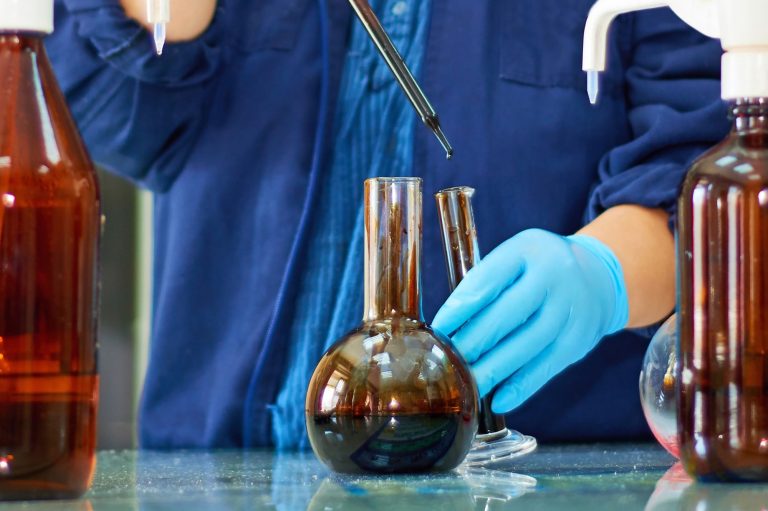TRAINING &
SAMPLE ANALYSIS
Training Courses & Instruction Services
In today's market where labor shortages are prevalent it is critical that laboratory managers retain personnel to reduce typical costs associated with turnover, but more importantly, to avoid possible extended vacancies due to a limited labor pool.
We agree on the importance of training and realize it is not always easy to send personnel to off-site training due to costs for travel and time away from the lab. The lab manager must consider alternative solutions for optimizing lab personnel training. ALSC and our partners can provide customized training & instruction programs at or near your site which reduces or eliminates lab personnel travel expenses and time out-of-office.
A key advantage offered by our customizable training courses & instruction services is the ability to eliminate the usual generality of courses by providing training solutions applicable to each client's needs, while still considering the overall market trends and analytical advances used throughout each client's industry. This gives our clients the ability to see the "larger picture" of analyses and methodologies available to them while providing advanced training and improving analysts' skills on the analytical techniques currently utilized. In addition to offering fully customizable training courses per client requests, we have developed several course topics, each of which can be customized as needed.
Industry Technical Seminar Series
Join ALSC and our partners at Medusa Analytical for our online Industry Technical Seminar Series where we highlight leading advances seen and technical challenges faced within the hottest new industries.

January 17, 2024 Produced Water Seminar
- Geographical assessment of U.S. shale basins.
- Treatment modalities for produced water; beneficial re-use.
- Case Studies: research on treatment of produced water.
Packaged Training Solutions
Packages include, but are not limited to:
- Chemical Multi-fingerprinting: targeted and untargeted chemical analysis using various analytical techniques.
- Analytical developments and laboratory operations optimization for cannabis testing.
- Advances in analysis and disposal of produced water from unconventional oil and gas development activities.
- Methods for testing "forever chemicals" and their environmental impact.
- Quality control and troubleshooting waste plastics chemical recycling processes and their alternative energy and consumer goods products.
- Analytical training for the petroleum scientist.
- Quality management for the laboratory.
- Sampling systems essential.

CMF is a strategy that involves extended chemical speciation of a sample (or samples) using multiple analytical techniques. Traditional analytical tools and sample preparation focus on one sample dimension, i.e., analyte class. However, when an analyst is presented with a complex sample of various analyte classes, the use of CMF can help distinguish between sample classifications that were previously difficult to discern. Both targeted and untargeted measurements can be used concurrently to analyze different dimensions of a chemical sample and provide a more complete picture of its chemical make-up. Depending on the nature of the sample, techniques can incorporate gas chromatography, liquid chromatography, mass spectrometry, and various spectroscopic methods.

Cannabis
Under construction

Unconventional oil and gas development (UD) is the process of extracting petroleum hydrocarbons from impermeable subsurface strata, such as shale, using large volumes of water, proppants, and chemical additives. The stimulation of UD production wells yields two distinct waste streams: flowback water (FBW), which is representative of the composition of the hydraulic fracturing fluid, and produced water (PW), which is characteristic of the petroliferous strata of interest. Collectively, these two waste streams are referred to as flowback and produced water (FP). The management of FP requires financial and operational resources, and the recent linkage of subsurface disposal to the induction of anthropogenic earthquakes has expedited the need for effective management of these waste streams beyond the current subsurface disposal practice using saltwater disposal well (SWDs).

Forever Chemicals
Under construction.

Chemical Recycling
Under construction.

Includes a complete virtual tour of the petroleum analytical lab and bridges the gap between chemists and process engineers. Various standardized methodologies including ASTM, UOP, GPA are discussed.


We explore the quality systems, laboratory environment, instrumentation, method validation, and calibration issues laboratories face daily. We further examine data management, staff competence, and customer satisfaction.
Covers the design and fundamentals of understanding measurement details which impact final analytical needs, including representative samples and probe choices.
We need your consent to load the translations
We use a third-party service to translate the website content that may collect data about your activity. Please review the details in the privacy policy and accept the service to view the translations.

